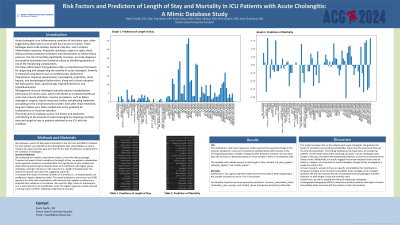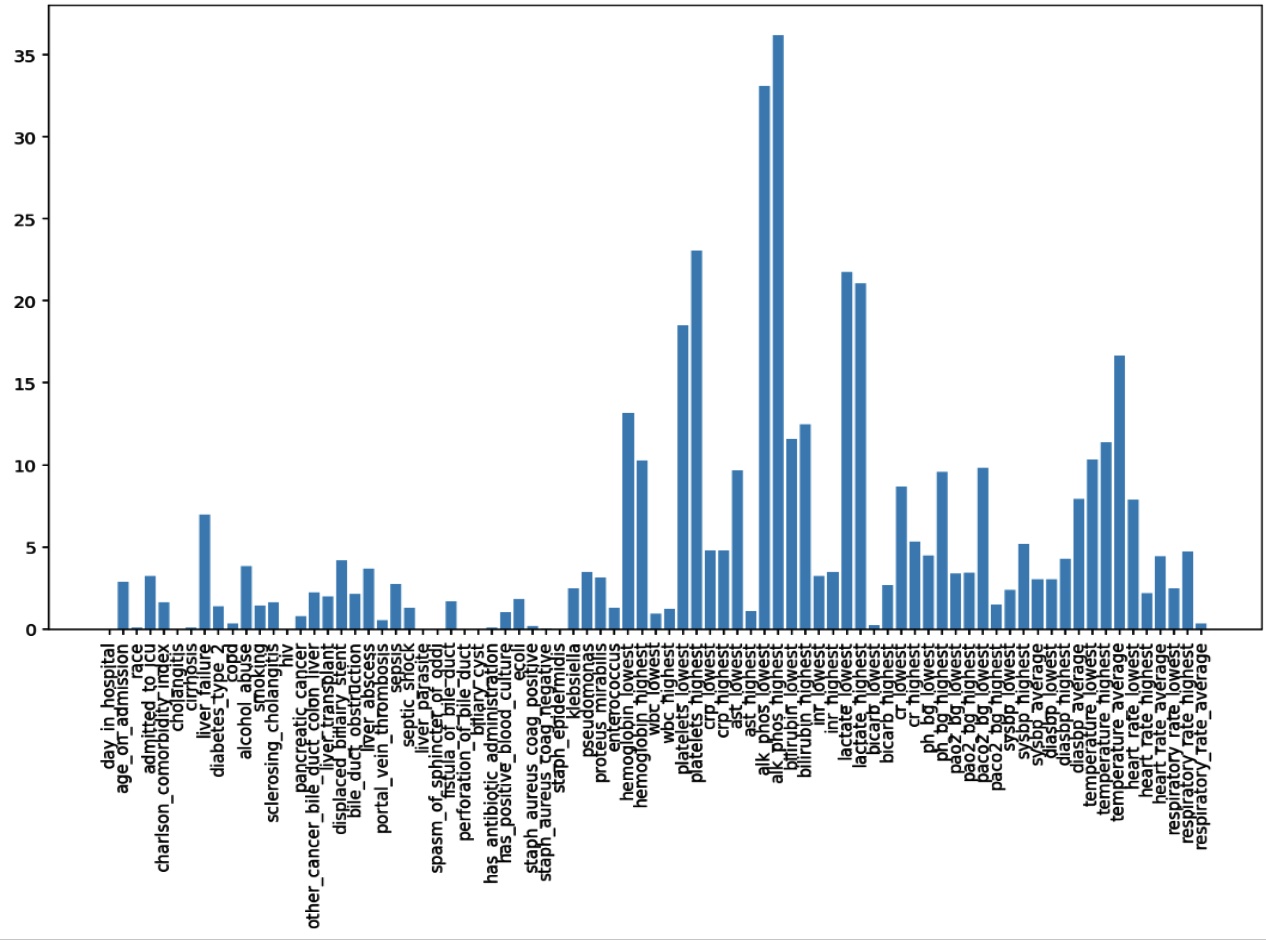Tuesday Poster Session
Category: Biliary/Pancreas
P3472 - Risk Factors and Predictors of Length of Stay and Mortality in ICU Patients With Acute Cholangitis: A Mimix Database Study
Tuesday, October 29, 2024
10:30 AM - 4:00 PM ET
Location: Exhibit Hall E

Has Audio
.jpg)
Mark Tawfik, DO
Staten Island University Hospital, Northwell Health
Staten Island, NY
Presenting Author(s)
Mark Tawfik, DO, Tyler Grantham, MD, Radu Grovu, MD, Chloe Lahoud, MD, Faris Qaqish, MD, Jean M. Chalhoub, MD
Staten Island University Hospital, Northwell Health, Staten Island, NY
Introduction: Acute cholangitis is a condition characterized by the inflammation of the biliary tract. It develops when obstructions, often from bile duct stones or tumors, cause blockages in the bile ducts, leading to bile buildup and bacterial infection. The Tokyo 18 guidelines provide a comprehensive framework for categorizing the severity of this condition. This study aims to analyze various risk factors contributing to the severity of acute cholangitis as per these guidelines.
Methods: We retrieved a cohort of 305 ICU patients from the MIMIC IV dataset, collecting demographics, comorbidities, lab values, and vital signs over 5 days. Using Python 3.9 and sklearn, we performed analytics. A standardized linear regression model on normalized data assessed the impact of variables on length of stay, with significance judged by the absolute value of coefficients; higher values indicated greater impact. The model had an R-squared value of 0.65, indicating a good fit. For mortality prediction, we configured a Logistic Regression model using an 'ovr' approach with balanced class weights and the 'lbfgs' solver. The model achieved a training score of 0.9547, indicating high accuracy.
Results: LOS: Coefficients in the linear regression table represent the expected change in the outcome variable for a one-unit increase (the standard being 10% increase) in the corresponding predictor variable, holding all other predictors constant. So how many days LOS increases of decreases based on if that variable is there or increased by 10%. The variables with notable impacts on the length of stay included Alk phos highest, platelets highest, and Lactate lowest.
Mortality: Coefficients in the logistic regression table represent the odds of death happening if the variable increases by one. For mortality inpatient we found several key predictors, charlson comorbidity index, respiratory rate average, and alcohol abuse emerged as particularly influential.
Discussion: This study has highlighted that the highest risk of mortality in ICU patients with acute cholangitis is pre-existing comorbidities, not severity of illness at time of presentation. Length of Stay was associated with known predictors of severity according to Tokyo criteria. Certain bacteria strains may have higher risk of mortality than others in acute cholangitis. Further resa

Disclosures:
Mark Tawfik, DO, Tyler Grantham, MD, Radu Grovu, MD, Chloe Lahoud, MD, Faris Qaqish, MD, Jean M. Chalhoub, MD. P3472 - Risk Factors and Predictors of Length of Stay and Mortality in ICU Patients With Acute Cholangitis: A Mimix Database Study, ACG 2024 Annual Scientific Meeting Abstracts. Philadelphia, PA: American College of Gastroenterology.
Staten Island University Hospital, Northwell Health, Staten Island, NY
Introduction: Acute cholangitis is a condition characterized by the inflammation of the biliary tract. It develops when obstructions, often from bile duct stones or tumors, cause blockages in the bile ducts, leading to bile buildup and bacterial infection. The Tokyo 18 guidelines provide a comprehensive framework for categorizing the severity of this condition. This study aims to analyze various risk factors contributing to the severity of acute cholangitis as per these guidelines.
Methods: We retrieved a cohort of 305 ICU patients from the MIMIC IV dataset, collecting demographics, comorbidities, lab values, and vital signs over 5 days. Using Python 3.9 and sklearn, we performed analytics. A standardized linear regression model on normalized data assessed the impact of variables on length of stay, with significance judged by the absolute value of coefficients; higher values indicated greater impact. The model had an R-squared value of 0.65, indicating a good fit. For mortality prediction, we configured a Logistic Regression model using an 'ovr' approach with balanced class weights and the 'lbfgs' solver. The model achieved a training score of 0.9547, indicating high accuracy.
Results: LOS: Coefficients in the linear regression table represent the expected change in the outcome variable for a one-unit increase (the standard being 10% increase) in the corresponding predictor variable, holding all other predictors constant. So how many days LOS increases of decreases based on if that variable is there or increased by 10%. The variables with notable impacts on the length of stay included Alk phos highest, platelets highest, and Lactate lowest.
Mortality: Coefficients in the logistic regression table represent the odds of death happening if the variable increases by one. For mortality inpatient we found several key predictors, charlson comorbidity index, respiratory rate average, and alcohol abuse emerged as particularly influential.
Discussion: This study has highlighted that the highest risk of mortality in ICU patients with acute cholangitis is pre-existing comorbidities, not severity of illness at time of presentation. Length of Stay was associated with known predictors of severity according to Tokyo criteria. Certain bacteria strains may have higher risk of mortality than others in acute cholangitis. Further resa

Figure: Figure 1: Predictors of Length of Stay
Disclosures:
Mark Tawfik indicated no relevant financial relationships.
Tyler Grantham indicated no relevant financial relationships.
Radu Grovu indicated no relevant financial relationships.
Chloe Lahoud indicated no relevant financial relationships.
Faris Qaqish indicated no relevant financial relationships.
Jean Chalhoub indicated no relevant financial relationships.
Mark Tawfik, DO, Tyler Grantham, MD, Radu Grovu, MD, Chloe Lahoud, MD, Faris Qaqish, MD, Jean M. Chalhoub, MD. P3472 - Risk Factors and Predictors of Length of Stay and Mortality in ICU Patients With Acute Cholangitis: A Mimix Database Study, ACG 2024 Annual Scientific Meeting Abstracts. Philadelphia, PA: American College of Gastroenterology.
